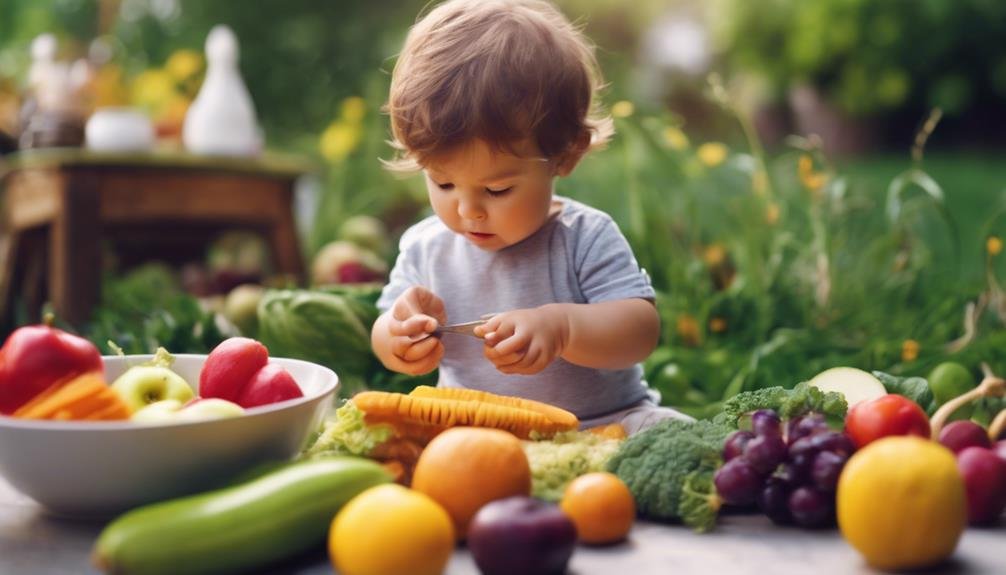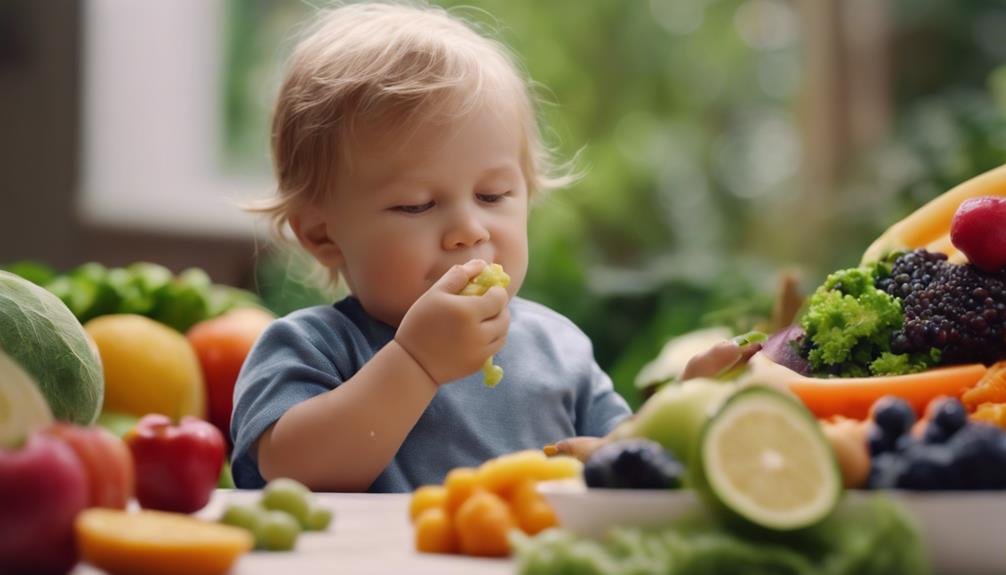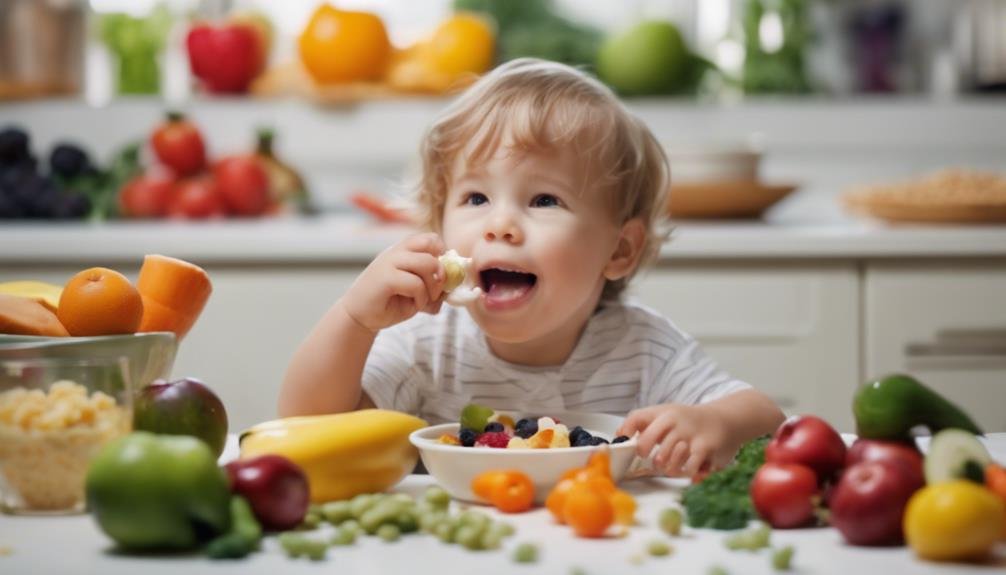"Cherishing Little Steps - A Haven for Baby and Family Journeys"
The Impact of Gut Health on Toddler Wellbeing: Insights and Advice
You might think that the impact of gut health on toddlers is something to worry about later, but addressing it early can lay a solid foundation for their overall wellbeing. Understanding how crucial a healthy gut is for your toddler's development is key. As you navigate the complexities of parenting, consider how their gut health could be influencing various aspects of their life. Stay tuned to discover practical insights and valuable advice on nurturing your toddler's gut health to support their growth and vitality.
Key Takeaways
- Good gut health in toddlers crucial for overall development and wellbeing.
- Balanced diet rich in fiber and nutrients supports healthy gut flora.
- Gut microbiota influences brain function and immune system.
- Probiotics and prebiotics aid in maintaining a diverse gut microbiome.
- Signs of poor gut health include digestive issues, infections, and skin problems.
Importance of Gut Health in Toddlers

Ensuring good gut health in toddlers is crucial for their overall wellbeing and development. The digestive system plays a vital role in absorbing nutrients, supporting the immune system, and even influencing mood. As a parent or caregiver, you hold the key to fostering a healthy gut environment for your little one.
One essential aspect of promoting good gut health in toddlers is providing a balanced diet rich in fiber, fruits, vegetables, and whole grains. These foods help maintain a diverse microbiome, which is essential for proper digestion and nutrient absorption. Encouraging hydration and limiting sugary drinks can also contribute to a healthier gut.
Additionally, avoiding unnecessary antibiotic use unless prescribed by a healthcare professional is important. Antibiotics can disrupt the natural balance of bacteria in the gut, potentially leading to digestive issues. When antibiotics are necessary, consider incorporating probiotics or prebiotics to help restore the gut flora.
Gut-Brain Connection in Toddlers
Promoting a healthy gut can positively impact your toddler's brain development and overall emotional well-being. The gut-brain connection in toddlers is a fascinating area of study that highlights the intricate relationship between the digestive system and the brain. Here are some key insights to help you understand this important connection:
- Gut Microbiota: The diverse community of microorganisms in your toddler's gut plays a crucial role in influencing brain function.
- Neurotransmitters: The gut produces neurotransmitters like serotonin, which are essential for regulating mood and emotions.
- Inflammation: Imbalances in gut health can lead to inflammation, which may affect brain health and behavior.
- Immune System: The gut is closely linked to the immune system, impacting how the body responds to stress and infection.
- Developmental Milestones: A healthy gut can support cognitive development and help your toddler reach important developmental milestones.
Factors Affecting Toddler Gut Health

Maintaining a balanced diet is key to supporting optimal gut health in toddlers. The food your child eats plays a crucial role in the health of their gut. Diets high in fiber from fruits, vegetables, and whole grains promote the growth of beneficial bacteria in the gut. On the other hand, excessive consumption of sugary snacks and processed foods can disrupt the balance of gut bacteria, leading to potential health issues.
Another factor that can impact toddler gut health is antibiotic use. While antibiotics are sometimes necessary to treat bacterial infections, they can also kill off good bacteria in the gut along with the harmful ones. It's essential to use antibiotics judiciously and always follow your healthcare provider's instructions.
Additionally, exposure to environmental toxins, stress, and lack of physical activity can all influence the health of your toddler's gut. By being mindful of these factors and making small, positive changes in your child's lifestyle, you can help support their gut health and overall wellbeing.
Signs of Poor Gut Health in Toddlers
Detecting signs of poor gut health in toddlers early is crucial for addressing potential issues and promoting overall wellbeing. As a caregiver, being attuned to these signs can help you take proactive steps to support your toddler's health.
Here are some common indicators that may suggest your toddler is experiencing poor gut health:
- Digestive Issues: Persistent constipation, diarrhea, bloating, or stomach pains can be signs of an imbalanced gut.
- Frequent Infections: If your toddler is frequently falling ill or experiencing recurrent infections, it could indicate a weakened immune system linked to gut health.
- Skin Problems: Eczema, rashes, or other skin irritations may be connected to gut issues in toddlers.
- Behavioral Changes: Unexplained changes in mood, irritability, or difficulty concentrating could be linked to gut health imbalances.
- Food Sensitivities: Persistent reactions to certain foods or an increase in food sensitivities may point to gut health issues in toddlers.
Being mindful of these signs and seeking guidance from healthcare providers can help you better support your toddler's gut health and overall wellbeing.
Nurturing a Healthy Gut in Toddlers

To nurture a healthy gut in toddlers, focus on incorporating diverse and nutritious foods into their diet. The foods you introduce to your toddler play a crucial role in maintaining their gut health. Aim to include a variety of fruits, vegetables, whole grains, lean proteins, and healthy fats in their meals. These foods provide essential nutrients and fiber that support a balanced gut flora.
Additionally, encourage your toddler to drink an adequate amount of water throughout the day. Proper hydration is key to supporting digestion and overall gut health. Limiting sugary drinks and excessive amounts of juice can also contribute to a healthier gut environment for your little one.
Probiotics and Prebiotics for Toddlers
When considering the gut health of your toddler, incorporating probiotics and prebiotics into their diet can be beneficial for maintaining a balanced gut flora. Probiotics are live bacteria that are good for your child's digestive system, while prebiotics are non-digestible fibers that promote the growth of beneficial bacteria in the gut.
Here are some key points to understand about probiotics and prebiotics for toddlers:
- Probiotics help in restoring the natural balance of gut bacteria.
- Prebiotics act as food for probiotics, aiding in their growth and activity.
- Including yogurt, kefir, or fermented foods in your toddler's diet can introduce probiotics.
- Prebiotics can be found in foods like bananas, onions, garlic, and whole grains.
- Both probiotics and prebiotics work together to support a healthy gut environment for your toddler.
Tips for Improving Toddler Gut Health

To support your toddler's gut health, consider incorporating diverse fruits and vegetables into their daily meals. These nutrient-packed foods not only provide essential vitamins and minerals but also fiber that promotes a healthy digestive system. Aim for a rainbow of colors on their plate to ensure a variety of nutrients that can benefit their gut flora.
Additionally, whole grains like oats, quinoa, and brown rice are excellent choices to support gut health. These grains contain fiber and resistant starch, which can help fuel beneficial bacteria in the gut. Ensuring your toddler stays hydrated is also crucial for their digestive system to function optimally. Encourage them to drink water throughout the day and limit sugary beverages that can disrupt gut flora balance.
Lastly, incorporating fermented foods like yogurt, kefir, and sauerkraut can introduce probiotics that support a healthy gut environment. These foods can help maintain a good balance of bacteria in the gut, promoting overall digestive wellness for your little one. By making these small but impactful changes to their diet, you can help improve your toddler's gut health and overall wellbeing.
Frequently Asked Questions
Can Environmental Factors Impact Toddler Gut Health?
Environmental factors can indeed impact toddler gut health. Factors like diet, exposure to antibiotics, and stress can all play a role. It's important to be mindful of these influences and prioritize a healthy environment for your little one.
Are Food Allergies Linked to Poor Gut Health in Toddlers?
Yes, food allergies can be linked to poor gut health in toddlers. When the gut lining is compromised, it can lead to increased permeability and trigger allergic responses. Ensuring a balanced diet and probiotics may help improve gut health.
How Does Stress Affect the Gut-Brain Connection in Toddlers?
When stress affects toddlers, it can disrupt the gut-brain connection, leading to digestive issues. Understanding your child's emotions and providing a supportive environment can help maintain a healthy balance between their mind and gut.
Can Toddlers Inherit Gut Health Issues From Their Parents?
Yes, toddlers can inherit gut health issues from their parents. Genetics play a role in gut health, so it's important to be mindful of family history. Understanding this link can help you make informed choices for your child's well-being.
What Role Does Physical Activity Play in Toddler Gut Health?
To boost toddler gut health, engage in active play! Running, jumping, and exploring not only strengthen muscles but also support digestion. Encourage movement for a happy tummy and a healthy body.
Conclusion
In conclusion, taking care of your toddler's gut health is like tending to a delicate garden – nurturing it with the right balance of nutrients and care to help it flourish.
By paying attention to signs of poor gut health, incorporating probiotics and prebiotics, and maintaining a healthy diet, you can set the foundation for your child's overall wellbeing and development.
Remember, a healthy gut equals a happy toddler!


